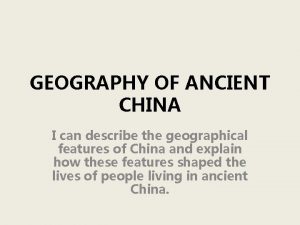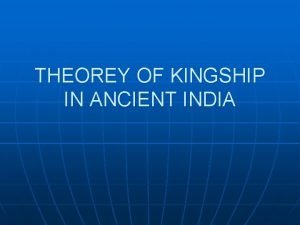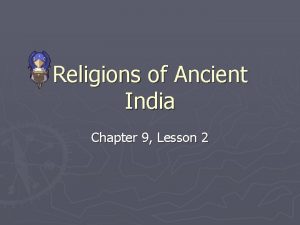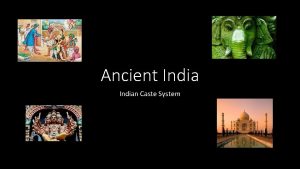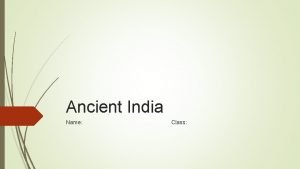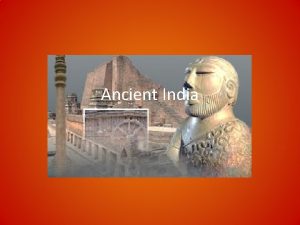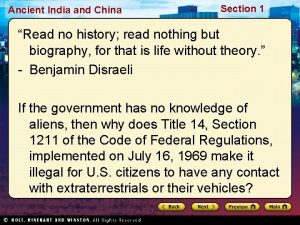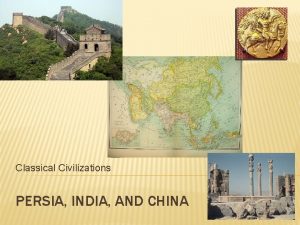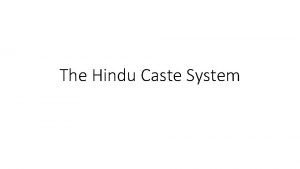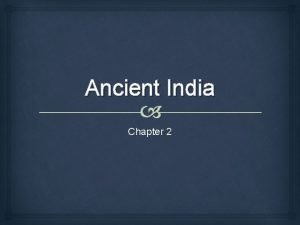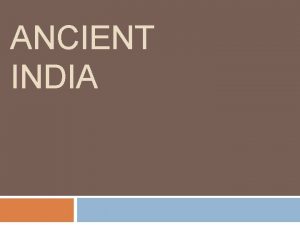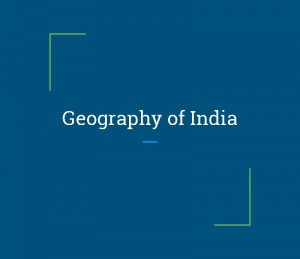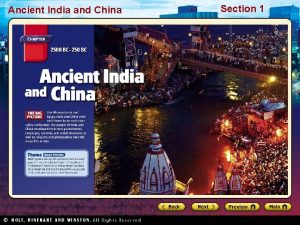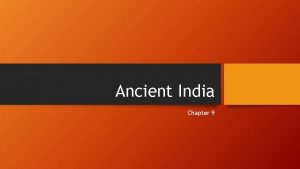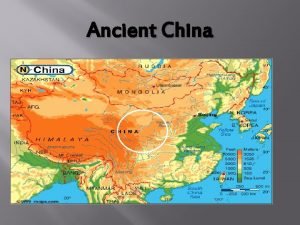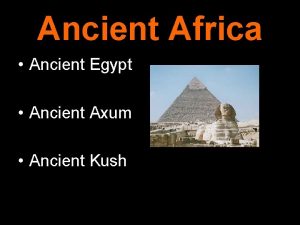Ancient China Geography of China Like India China











- Slides: 11

Ancient China

• Geography of China Like India, China is somewhat isolated by natural barriers, though they weren’t as protected – Yellow Sea, the East China Sea and the Pacific Ocean to the East – Taklimakan Desert and Tibetan Plateau to the West – Mongolian Plateau and Gobi Desert to the North – Himalayas to the Southwest • 4000 B. C. People settle along the Huang He (north) and Yangtze rivers(south) • North China Plain – center of Civilization – is located between the rivers • The Huang He river leaves Loess – fertile soil – but it also causes a lot of flooding – nicknamed “China’s Sorrow” (whole villages can be submerged

First Dynasties • 2, 000 B. C. – Xia Dynasty forms – China’s first dynasty • Learn to Control the Huang He River – Legendary “Yellow Emperor” Yu the Great engineered a dam for the Huang He River that saved the homes of Chinese citizens – He worked with an equally famous agricultural master Houji to create the dam and irrigation ducts – Said to have eaten and slept with the workers and had callused hands because of the work – Created a capital in Anyi – Thought of as a great and just ruler • 1700 – 1027 B. C. – Shang Dynasty emerged and claimed power in Northern China – First to Leave written records – mostly on shell and bone (oracle bones) – Moved downward and overthrew the last Xia emperor; practiced dynastic control in earnest – Established a new capital at Anyang – ruled for several centuries – The city was almost entirely made of wood – high class nobles lived in fine houses of timber while peasants lived in houses of clay and straw. – Also surrounded their cities with walls for protection and imported the chariot from Western Asia for war


Culture and Family • In the Chinese view, people who lived outside of their society were barbarians, called themselves the Middle Kingdom because they thought they were the center of the civilized world • People valued the group more than the individual and paid respect/homage to the ruler of the Middle Kingdom (even if he wasn’t a great ruler, you had to honor him) • Family is one of the most important institutions in China – People make decisions based on what’s good for the family instead of what they want individually • Oldest male controls family property – Women have to obey men; fathers, uncles, – – husbands and later their sons Between the ages of 13 – 16, girls were being betrothed /getting ready for marriage – then she would move into her husband’s house when married Women cannot own property, manage businesses, etc. Only by bearing sons could she cement her status as a valuable wife who did her duty Its going to also be hard/rare for noble women to achieve any form of freedom as well

Religious Beliefs • Early Chinese worship their ancestors through offerings and prayers – Believed that spirits become like supernatural beings like gods that can protect or guide the living – More respect was given to the father’s ancestors in the family • There was a Believed in “gods” - more like supernatural spirits – had limited interaction with the world – The Shang believed in one major god, Shang Di, and several lesser gods – Later on, Shangdi became an equivalent for a Heaven-like space (Han Dynasty) • Oracle Bones used to communicate with gods /ancestors(reveal the future) – Priests would scratch questions on the bones, stick a hot poker to them and watch them crack – the cracks would be interpreted for answers

Shangdi – “Heaven”

Myth 1: “Nuwa and Restoring the Pillars – Humans” Myth 2: “Pangu” (Earth – Ying, Sky – Yang)

Writi ng – Writing system uses symbols to represent syllables – People of different languages can use same system – Huge number of characters make system difficult to learn – thousands of characters exist/ different languages have different characters/pronunciations

• Zhou and the Dynastic 1027 B. C. – Zhou took power from. Cycle Shang and took over China – Shang had been spread too thin and there had been numerous problems plaguing them during their last years • Used the Mandate of Heaven – Claim that ruler had divine authority to rule Justified the Zhou in taking power from the Shang – were weak, so a new/stronger family should take charge – A just ruler has divine approval to take power – a wicked or foolish king could lose approval and the right to rule – In other words, taking power is fair game to anyone strong enough for it • Dynastic Cycle – Pattern of the rise and fall of dynasties – Zhou enforced the concept of dynasties, laid foundations for how future dynasties would rule/administer china

Chapter 1 -2 Test Review
 Ancient india vs ancient china
Ancient india vs ancient china China geography
China geography Kingship in ancient india
Kingship in ancient india Lesson 2 religions of ancient india
Lesson 2 religions of ancient india Ancient india lesson 1 early civilizations
Ancient india lesson 1 early civilizations Ancient india caste system pyramid
Ancient india caste system pyramid Ancient india mr nicky
Ancient india mr nicky Social class of ancient india
Social class of ancient india Jobs in ancient india
Jobs in ancient india The two classical civilizations of ancient india were the
The two classical civilizations of ancient india were the Ancient egypt medicine
Ancient egypt medicine Why?
Why?

